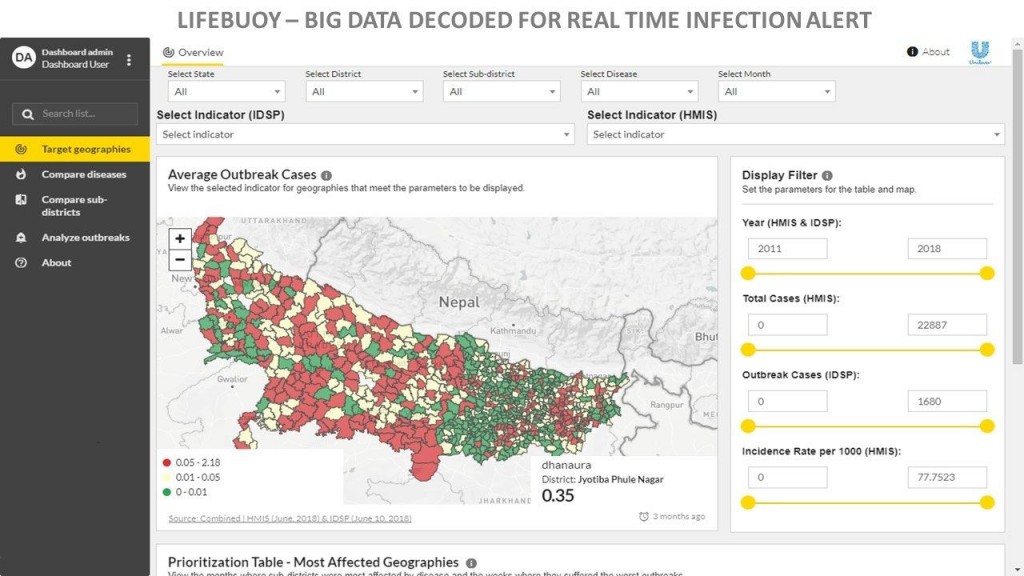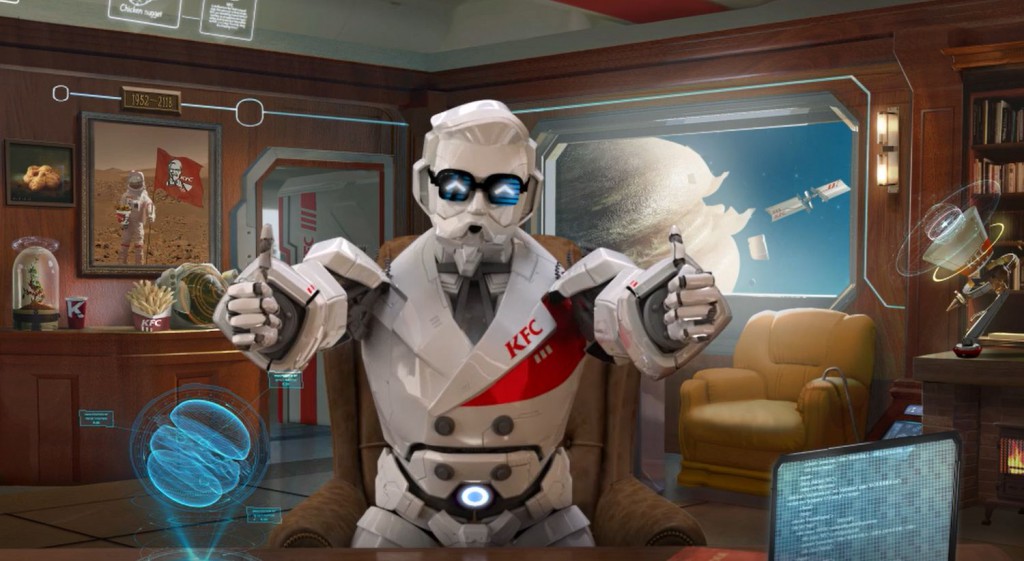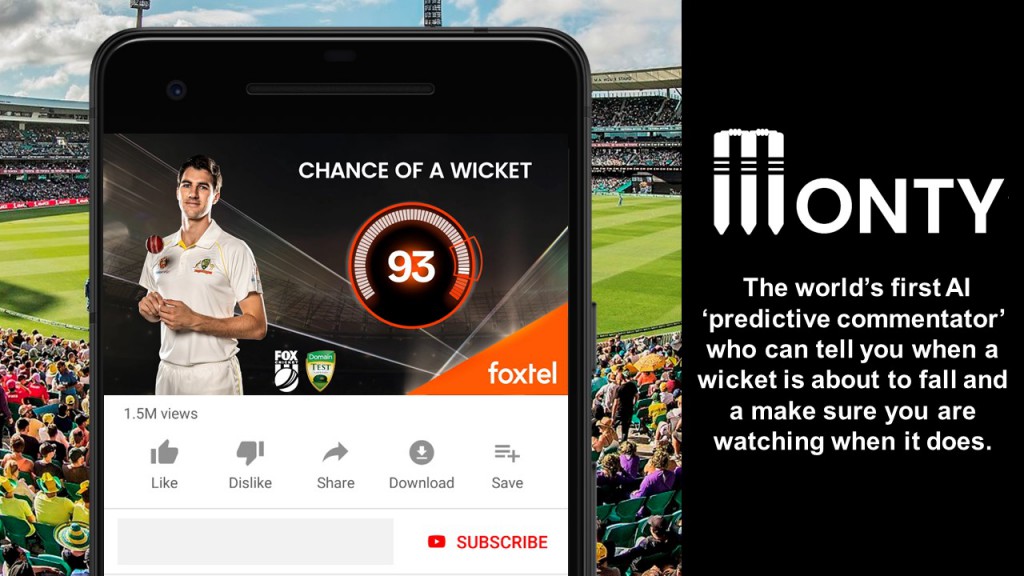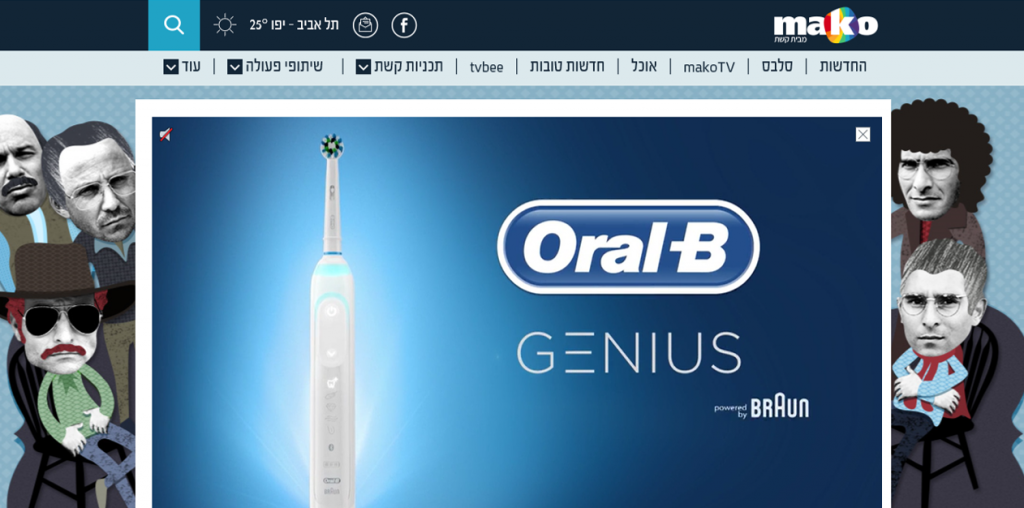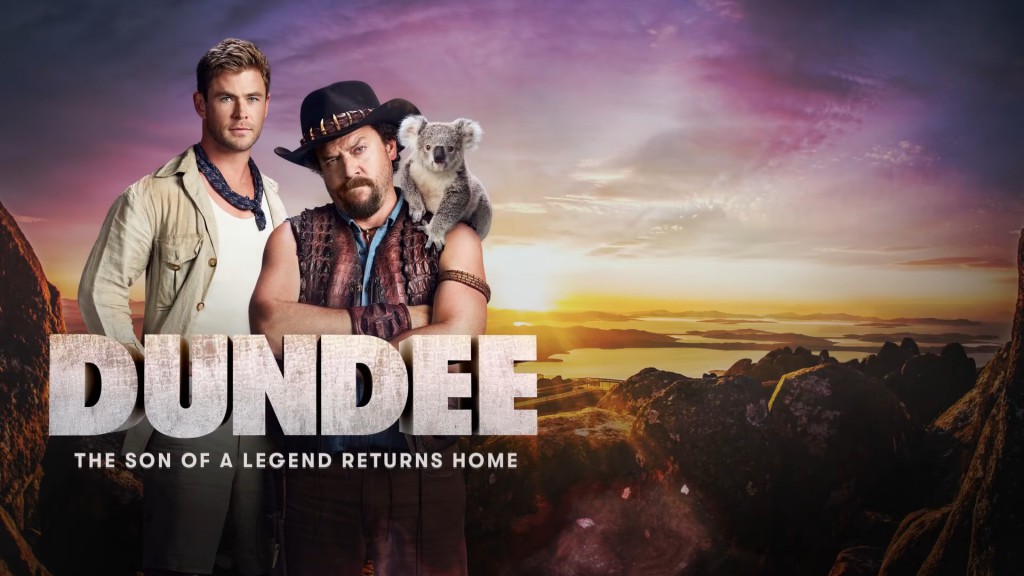Artificial intelligence (AI) has emerged as the hero tech innovation from the Festival of Media Global Awards 2019, having dominated in a number of campaigns that achieved multiple Gold, Silver and Bronze accolades.
What started out as a fantasy is now finally becoming reality. According to Statista, AI technology is being populated on such a scale that global market revenues are expected to grow from $7.4bn in 2018 to $89.85bn in 2025. It suggests that North America will account for the majority of those revenues, with Asia-Pacific and Europe battling for the second spot.
This global growth is supported by what we uncovered in the winning entries from this year’s Festival of Media Global Awards, with a number of brands tapping into machine learning, big data, predictive analysis and probability calculations, to bring campaigns to life through a range of media spanning mobile apps, gaming, live TV and more.
By country, the spread of award wins were dominated by China (15%) and US (15%), followed by Australia (12%), UK (10%), India (9%), Israel (7%) and Canada (7%). There was a strong representation of brand sectors ranging from FMCG, food & beverage, media & entertainment, telecoms, leisure & tourism to automotive brands included on the winners list.
On the agency front, Mediaplus walked away with ‘Independent Agency of the Year’ while Mindshare scooped ‘Agency Network of the Year’, in addition to Mindshare China being awarded ‘Agency of the Year’. Mindshare India also celebrated the success of ‘The Adaptive Data Lighthouse – Activating Infection Alert in Rural India’ for Hindustan Unilever’s Lifebuoy, which was crowned ‘Campaign of the Year’ after picking up six out of the eight trophies it was shortlisted for — a 75% success rate.
Similar to the trends we uncovered from the Festival of Media APAC Awards 2019 winners, the adoption of new technology and experimentation with new ways of using data has proven to be a global trend with marketers producing more sophisticated campaigns around the globe.
But the focus on AI, digital and technology didn’t entirely dominate across the board. A number of other multi-award winning campaigns showed that traditional media and on-the-ground activations still have a part to play. The award-winning work highlighted the power of considering the right media channel to share the communications message, as long as it’s in line with the objectives the individual campaign set out to achieve.
We put the spotlight on the five multi-award winning campaigns from the Festival of Media Global Awards 2019, which highlight this trend:
The Adaptive Data Lighthouse – Activating Infection Alert System in Rural India | Lifebuoy (Hindustan Unilever) | Mindshare | India
Shortlisted for: Best Use of Mobile (GOLD WINNER), The Effectiveness Award (GOLD WINNER), Best Local Execution of a Global Brand (SILVER WINNER), Best Use of Data & Insight Award (SILVER WINNER), Best Communications Strategy (BRONZE WINNER), Impact Awards (BRONZE WINNER), Best Use of Technology, The Creative Use of Media Award
Summary:
70% of sales for Lifebuoy, India’s number-one soap brand comes from rural India. While Lifebuoy has made successful inroads into urban India and built its equity as the best soap for protection against germs, rural has always been a tough battle with maximum share loss coming from this sector. With low traditional media penetration, low literacy rates and 79% of consumers using feature phones in the largest states of Uttar Pradesh (UP) and Bihar contributing to 30% of rural population, reaching consumers for driving relevance is a challenge.
Lifebuoy wanted to drive salience and hand-hygiene behavioural change in rural India by creating a data-led infection alert system for predicting severity of disease incidence and prioritising villages most vulnerable to life-threatening communicable diseases. Mindshare institutionalised the Adaptive Data Lighthouse (ADL) – a Data-led Infection Alert System for micro-targeting disease vulnerable villages at scale with contextual communication. Fuelled by data from 34,000 hospitals across 822 rural villages in UP & Bihar, the data layer of ADL was created which comprised of historical incidence data pertaining to 21 communicable diseases at a village level. This updated weekly, in near-real time through end-to-end data pipelines.
Lifebuoy partnered with leading telecom players in India, Vodafone, Airtel & Jio to leverage a 100M mobile database. This database was mapped to the weekly report from the ADL to ensure customised messages were pushed only to infection affected villages. On average eight million calls were dialled every week covering a minimum of 60 relevant and prioritised villages / sub districts across Uttar Pradesh and Bihar to ensure consumers take preventive measures against infections for them as well as their families.
KFC The First Colonel to Conquer eSports | KFC | Mindshare | China
Shortlisted for: Best Use of Live-Streaming (GOLD WINNER), Best Use of Real-time Marketing (GOLD WINNER), Best Branded Content in digital channels (SILVER WINNER), Best Use of Digital Media (BRONZE WINNER), Best Local Execution of a Global Brand
Summary:
Gamers like their numbers. Win ratios. Gold collected. Magic stats. Health stats. Attack damage. eSports games like League of Legends have many more numbers than a typical game of football or basketball. No typical fan has the time to do predictive probability calculations while watching a game which has four or five things happening all at the same time. One famous online influencer Huang Xudong bravely attempted to make these predictions for fans. However, he became even more famous because of wrong predictions, so fans jokingly nicknamed him “Poison Milk”. Hence, KFC saw this as the biggest opportunity to address an unmet need and elevate the fan experience.
Enter Colonel KI (KFC-AI) – KFC’s AI algorithm for predicting League of Legend winners. Giving fans this new capability was the only way for KFC to be truly integral to the experience, and The Colonel was the perfect persona to deliver this to fans.KFC partnered with data company PentaQ to create an algorithm based on all historical data and real-time data for each team. The algorithm in the form of Colonel KI was capable of giving out real-time predictions on who would win a match based on game stats. KFC added value from start to finish as all gamers and fans could track the predictions before, during and after the matches. This approach served the objective of making KFC an integral part of the game, bringing added value to the game, gamers, fans, and of course, the brand.
Colonel KI’s predictions were featured on the actual game screen. He appeared at the beginning of each game and in every break during the live-streaming to give predictions. During the game, a Colonel KI graph at the bottom of the screen appeared to show real-time win rates (pointing to the team who is likely to win) that changed as the game progressed. Fans could also log into the KFC app to access and track the predictions throughout the match. At the most exciting moments of the game, Colonel KI also served as a warm-hearted cheerleader and distributed KFC coupons to all fans – inviting the audience to order KFC online and have fried chicken while enjoying the game.
Monty: The World’s First AI Predictive Commentator | Foxtel | Mindshare | Australia
Shortlisted for: Tech Innovator Award (GOLD WINNER), Best Use of Digital Media (SILVER WINNER), Best Use of Real-time Marketing (SILVER WINNER), Best Use of Technology (BRONZE WINNER), Special Award – Best Adtech / MarTech Platform (WINNER)
Summary:
Cricket is the soundtrack to the Australian summer. But with the typical match running for five days and with a maximum of 40 wickets in 2,700 balls – each lasting less than half a second – that equates to just 18.2 seconds of truly meaningful moments in 30 hours of play… and with the lure of the beach and barbie (not to mention badly scheduled toilet breaks) Foxtel found that most people missed these key moments in live play and had to watch replays. Most key moments in its audience’s favourite sporting pastime had never been seen truly live.
Armed with this, Mindshare knew it had to deliver more value for their Foxtel subscription and transform the viewing experience from a passive, lean-back experience, reacting to what you’ve missed; to a lean-in moment, primed for something crucial to happen. In short, it had to predict wickets. Cricket is a hugely complex game, with almost impenetrable rules (to some) and a huge amount of variables – making it almost impossible to predict… for a human.
Introducing Monty, the world’s first AI ‘predictive commentator’ who can tell you when a wicket is about to fall and make sure you are watching when it does. First, it trained Monty, feeding him an entire year’s worth of Australian cricket team data – every ball faced and every ball bowled across Test, T20 and ODI cricket – each ball with 83 data variables attached to it. Instead of buying media inventory with the media budget, the agency bought data, investing 3:1 into data against standard media. Once it was confident that it had a fully operational Monty, Mindshare created an API output that could be used to trigger time sensitive adverts across video, digital outdoor and display directing subscribers to tune in to watch a wicket and maximise their subscription and directing non-subscribers to sign up to catch the wickets.
You’re Out! | Oral-B (Procter & Gamble) | MediaCom | Israel
Shortlisted for: Best Local Execution of a Global Brand (GOLD WINNER), Best Launch Campaign (SILVER WINNER), Best Influencer Campaign (SILVER WINNER), Special Award – Brand Bravery Award (WINNER)
Summary:
Oral B has been trying to convert Israelis to electric toothbrushes for years. Sadly, only 20% of adults switched from manual brushes – one of the lowest rates in the developed world. Despite dentists’ endorsement and millions spent on advertising, the high initial cost and a sense that electric toothbrushes are only for people with serious dental issues have created an impenetrable barrier. The launch of the new Oral-B Genius brush, with its position detection technology, served as an opportunity. It could finally promise a 100% clean that manual brushing couldn’t.
MediaCom’s insight was that there was one day of the year when only 100% was good enough: Yom Kippur. It’s the holiest day of the year when Jewish people repent for their sins and fast for 25 hours. The country shuts down – no traffic, no media, no eating or drinking. So it hijacked Yom Kippur – the holiest day of the year in Israel – with a “100% clean teeth” message.
The agency conducted a live side-by-side demo in which it recreated a typical pre-fasting holiday meal. Then it pitted manual against electric toothbrushes to prove the 100% claim. The results were certified by an impartial judge (a dentist) who inspected participants’ mouths after they brushed. It used this verdict to secure the blessing of the highest rabbinical authority and a religious decree that only electric brushing could save them from sin. It then launched a mass media campaign in Print and OOH in the run up to Yom Kippur which highlighted the results of the demo and the rabbinical recommendation to use Oral B’s electric brushes prior to the fast. Online it took over all media content relating to the fasting – how to prepare the body, exact timings, what should one eat before – ensuring that everyone fasting knew that only Oral B would do.
Dundee: The Son of a Legend Returns Home | Tourism Australia | UM Worldwide | US
Shortlisted for: Best Use of Content (GOLD WINNER), Best Communications Strategy (SILVER WINNER), Best Multi-screen Campaign (SILVER WINNER), Best Influencer Campaign (BRONZE WINNER)
Summary:
While the world loves the idea of an Australian holiday (it ranks third in the world in desire), the ‘tyranny of distance’ means it struggles to convert that desire to visitation. With Europe and the Caribbean so close to the US, Tourism Australia’s traditional campaigns promoting its wine and beaches weren’t presenting a compelling enough argument for the extra 10 hours on a plane.
In 1986, Crocodile Dundee introduced Americans to the land down under. The iconic film put Australia on the map, and in fact it’s still the first association many Americans have when they think of Australia. The problem is that the world, and Australia, has evolved dramatically since then. Enter the latest Hollywood craze: Classic film reboots.
In January 2018, it announced the return of the beloved franchise with DUNDEE: THE SON OF A LEGEND RETURNS HOME. Presented as a buddy comedy in which Danny McBride (Brian Dundee) teams up with Chris Hemsworth (Wally Jr.) to save Mick ‘Crocodile’ Dundee from danger, the duo runs into a star-studded Australian cast along the way. UM kicked off an integrated tourism campaign unlike any other with teaser films and a promotional campaign encouraged fans to tune-in to see the “official movie trailer” during Super Bowl LII. However, on the world’s biggest stage, it revealed there was no movie: it was an elaborate tourism ad for Australia.

